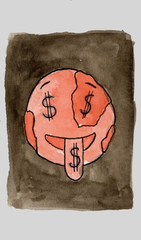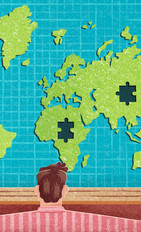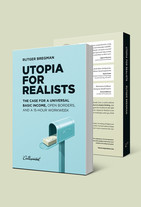Jason Trigg – a man in his late twenties with glasses and rosy cheeks – is brilliant. He graduated cum laude from MIT, easily one of the most prestigious universities in the world. An idealist, he wanted to use his talents for the greater good. So did he join a non-government organization? Or become a researcher at a university? Wrong on both counts.
He went to work for a hedge fund on Wall Street.
Now he earns more money than he can spend. And still he doesn’t spend it on fast cars or a luxury penthouse. Instead, he gives away half his six-figure salary to the Against Malaria Foundation.
Jason is part of a new movement called effective altruism. It consists of organizations and individuals that try to improve the world based on hard facts, rather than the feel-good factor. The movement is not yet ten years old, but it has already raised about $10 million, dewormed four million children, and distributed a million mosquito nets for protection against malaria.
Feel-good altruism
Effective altruism is a response to the feel-good altruism that has dominated the development aid sector for years – aid that makes the giver feel good but does little to help the recipient. The ultimate symbol of the feel-good approach is PlayPump – a playful merry-go-round that pumps water from the ground as it turns. Whereas traditional water pumps in African countries are powered by hand or water, PlayPump is powered by the energy of playing children.
Worst of all, no one had bothered to ask the villagers what they needed
Everyone praised this pump-as-you-play revelation: Bill Clinton called it a “wonderful innovation.” Jay-Z coughed up tens of thousands of dollars for the merry-go-round. Newspapers ran enthusiastic headlines like “Now pumping water is child’s play.” Its greatest triumph came in 2006 when PlayPumps International received a grant of $16.4 million, presented by then first lady Laura Bush. By 2009, some 1,800 play-pumps had been installed in Africa.
Then it all went awry as two reports burst the PlayPump bubble. There were cases of children falling off the merry-go-round and breaking legs. Some villages were paying children to “play”. And in other villages, women were being forced to turn the pumps themselves. Perhaps worst of all, no one had bothered to ask the villagers what they needed. The reports suggested that most of them preferred returning to the old-fashioned pump instead of the multi-colored merry-go-round.
The impact of doing good
PlayPump teaches us that goodwill doesn’t necessarily do good. So how do you know if something actually is working? Whether it’s truly reducing poverty, improving health care, or helping refugees? A growing group of researchers – with its epicenter at the Poverty Action Lab in the United States – is tackling these kinds of questions. The scientists use randomized controlled trials (RCTs), for instance, to study the impact of a project. It comes down to this: give one group aid but not the other. See how the groups differ afterwards and you’ve got an indication of the project’s impact.
The researchers looked at the effect of giving “free” welfare in poor countries. Cash in hand, no obligations. A bad idea, you might think. Poor people are sure to spend the money on alcohol or a new TV. But experiments have shown the opposite to be true: recipients didn’t spend the money on “bad things” at all. They saved or invested it.
In the wake of these researchers came the effective altruists, who aim to rationally determine the best way to spend their time and money. They always ask themselves the following question: how can I make the biggest difference? Their answer isn’t based on a gut feeling but on hard science. They calculate the impact of various aid scenarios. Then the effective altruists select the scenario that will have the biggest impact and – presto – they’ve figured out how to best spend their time and money. So they’re not only doing good, but they’re doing good well, too.
Illustration by Job Bant

Five questions
How would an effective altruist go about helping Syrian refugees? The Scottish philosopher William MacAskill, himself a prominent effective altruist, offers us some guidelines for putting effective altruism into practice in his new book Doing Good Better. If you want to donate money or time, he says, then you have to answer the following five questions.
Question 1. How many people benefit, and by how much?
You want to renovate your attic to house a Syrian family of five. So five people will benefit. The exact benefit is hard to gauge, but it does mean the difference between living on the streets and having a roof over your head.
Question 2. Is this the most effective thing I can do?
You could ditch your plans to renovate or you could rent out your fixed-up attic. The money that you save or earn can then go to an aid agency that will help many more refugees than you could house in your attic. These agencies have more expertise and experience, and because of their size they’re by definition more efficient than you and your attic.
Question 3. What would have happened otherwise?
The alternative scenario in question 1 was “living on the streets.” Is that true, though? If you don’t lift a finger, then maybe someone else will provide the family with a place to stay. Or perhaps the authorities will create more shelters. The “added value” is therefore not the difference between living in your attic and living on the streets, but between your attic and what would happen if you don’t do anything – accommodation with someone else or the shelter.
Question 4. What are the odds of success, and just how successful are we talking here?
The first question you have to ask yourself is what does “success” really mean? In this case, you could say it means the best possible life for Syrian refugees. There’s a good chance that this Syrian family will have a better life if they can stay in your renovated attic. But the scope of this success is limited: you’re only helping five people, but you’re not providing a long-term solution to the problem. After all, you could donate to an organization that campaigns for open borders. The odds of actually opening the borders may be slim, but if it works, then the effect would be huge, improving the lives of countless refugees.
Question 5. Is this area neglected?
Front-page news, major fundraising events, special TV benefit shows – let’s say refugees are receiving so much attention that many people are probably offering their services already. If it’s big impact you’re after, there’s little point in devoting your time and money to this matter, too. In fact, you would probably have a greater impact if you focused on a more obscure goal, like treating schoolchildren in Benin for intestional parasites.
But if you really want to help refugees, then take a cue from Jason Trigg and gear your career to the effective cause. Become a high-powered banker, rake in the money, and then turn around and make big donations to an effective charity. GiveDirectly is an example, an NGO that uses cell phones to transfer money to the poor in Kenya and Uganda.

Illustration by Job Bant
The drunk and the streetlight
A drunken man is on his hands and knees under a streetlight. A police officer asks what he’s doing. “I’m looking for my keys,” the man answers.
“Where did you drop them?”
The drunken man points to the end of the street. “Somewhere over there.”
“If you dropped them there,” the officer asks, “then why are you looking here?”
To which the man replies: “The light’s much better here.”
The danger of effective altruism is that the benefactor becomes like the drunken man, set on looking in one place. Though there are many solutions, the effective altruist only has eyes for solutions that have a demonstrable impact.
But not everything has been researched. RCTs are time-consuming and expensive. Some initiatives are too small to test impact in this way. And there are new situations arising every day that haven’t been studied yet, but are urgently in need of a charitable response. Europe’s refugee crisis is a case in point. What good are the five questions then?
There are new situations arising every day that haven’t been studied yet, but are urgently in need of a charitable response
And another thing: you can’t measure everything. What’s the impact of an organization like the Center for Global Development (CGD), which studies immigration, including its positive effects? CGD’s studies provide arguments in favor of discussing open borders, which would improve the lives of refugees in the long term. How do you evaluate the “effectiveness” of a group campaigning for future change?
It’s precisely the major problems – war, poverty, discrimination – that can’t be fixed with a single solution. It takes a variety of remedies to bring out long-term systematic change. Imagine what an effective altruist would tell Martin Luther King: “Martin, it’s time to stop dreaming. If you really want to help African Americans, then find a lucrative job and invest in a vaccine against smallpox.” That wouldn’t have changed the status quo in the U.S. and might have even – think of the hedge fund programmer on Wall Street – made it worse.
In that sense, altruists are obsessed with fighting symptoms and don’t necessarily look for solutions that really tackle the essence of the problem.
Nonsense, says effective altruist MacAskill. You can also answer the five questions in terms of finding solutions that address the status quo. This brings us back to the CGD. Try to estimate their chances of succeeding in opening borders. Now slap a dollar amount onto what you think the value of open borders would be if it were to actually happen. Multiply these two things and you’ll get the “expected value.”
But that takes us back to square one, because how on earth do you estimate the odds of something like this? It’s based on your good faith that something will succeed. And how do you measure the value of something? That’s always going to be personal. Some people would rather save a thousand animals that one human life. Or rather save a hundred lives a hundred years from now than one human life today.
Faith, value judgement – where have we heard that before? That’s right, that feel-good approach we’ve been using for years. Just because it’s been dressed up as science doesn’t make it any less subjective. The criticism of traditional aid work may be justified, but when it comes to complex solutions and problems, the effective altruists are just as much in the dark as the feel-good altruists.
Planet refugee!
Effective altruism shows how important it is to substantiate how you spend your time and money. It’s a great idea, but it can be taken too far.
The Effective Altruism Global Conference took place in late July 2015 in Silicon Valley. Was it about refugees? Human rights maybe?
Guess again.
It was about how to prevent the human race from extinction. Because if anything’s effective, if anything’s likely to have a big impact, then that is. And so the best way to spend your time and money, according to the people at the conference, is to find new planets for the human race to settle on.
So it’s really very simple: if you want to help refugees, just find a new planet for us all.
More from The Correspondent:
 Poverty 101: How can we end global poverty once and for all?
By 2030 the world must be free of extreme poverty. The question is how? Of course there’s no single answer. In this crash course on global poverty, we bring together as many answers as we can. We’ll look at the extent of the problem, the causes, and possible solutions.
Poverty 101: How can we end global poverty once and for all?
By 2030 the world must be free of extreme poverty. The question is how? Of course there’s no single answer. In this crash course on global poverty, we bring together as many answers as we can. We’ll look at the extent of the problem, the causes, and possible solutions.
 Why we know less about developing countries than we think
Africa boasts five of the world’s ten fastest-growing economies. And the percentage of poor and malnourished people worldwide has been cut by half in the last 25 years. Poor countries seem to be prospering – but is the rosy picture accurate? I crunched the numbers, and here’s the truth: when it comes to developing countries, there’s a lot we don’t know.
Why we know less about developing countries than we think
Africa boasts five of the world’s ten fastest-growing economies. And the percentage of poor and malnourished people worldwide has been cut by half in the last 25 years. Poor countries seem to be prospering – but is the rosy picture accurate? I crunched the numbers, and here’s the truth: when it comes to developing countries, there’s a lot we don’t know.
 What’s deadly dull and can save the world? (Hint: We can’t stand it)
What do poor people need most? Food? Healthcare? Education? The answer is as surprising as it is simple. And it can be found under fluorescent lights and modular ceilings.
What’s deadly dull and can save the world? (Hint: We can’t stand it)
What do poor people need most? Food? Healthcare? Education? The answer is as surprising as it is simple. And it can be found under fluorescent lights and modular ceilings.
 Utopia for Realists
Out now – our first book in English!
In Utopia for Realists: The Case for a Universal Basic Income, Open Borders, and a 15-hour Workweek, Rutger Bregman takes you on a journey beyond left-right divides to introduce ideas whose time has come.
Utopia for Realists
Out now – our first book in English!
In Utopia for Realists: The Case for a Universal Basic Income, Open Borders, and a 15-hour Workweek, Rutger Bregman takes you on a journey beyond left-right divides to introduce ideas whose time has come.





